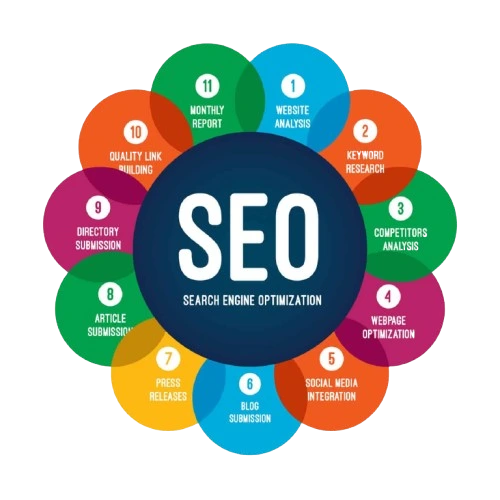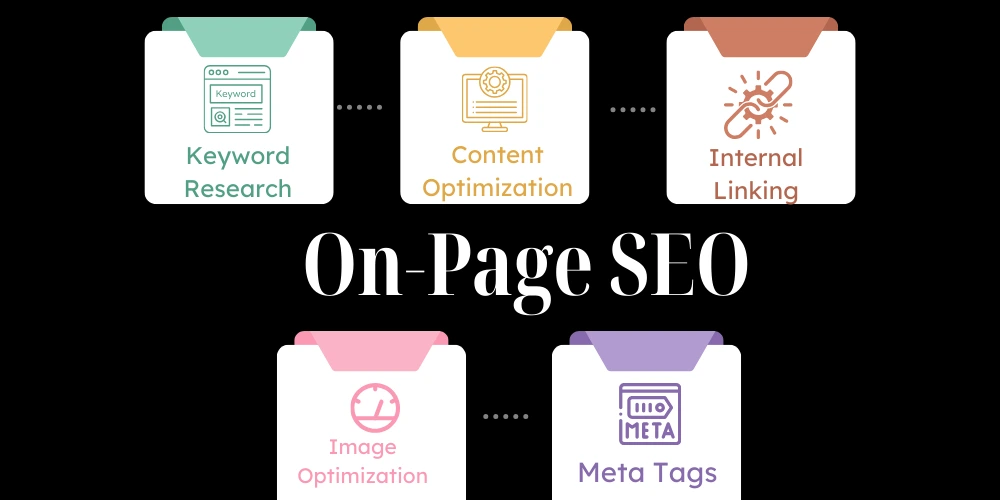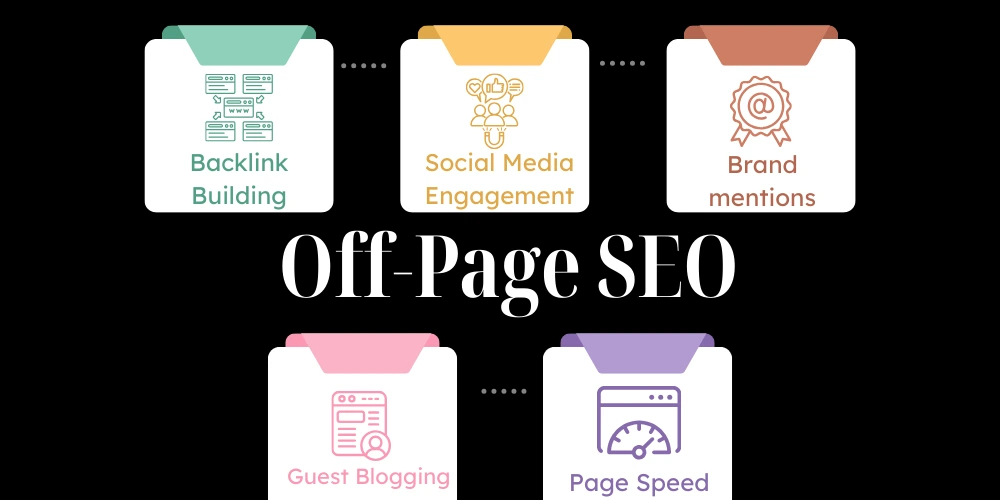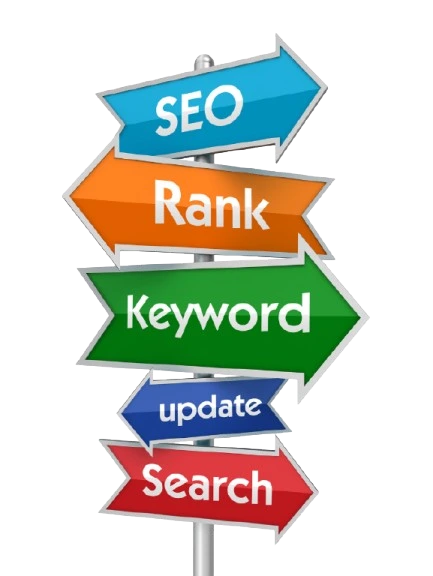Search Engine Optimization
Search Engine Optimization
We Make Perfect Solution in Business
SEO (Search Engine Optimization) is the process of enhancing a website's visibility in search engine results pages (SERPs) for relevant queries. The main goal is to boost organic (non-paid) traffic by optimizing the website to rank higher on search engines like Google, Bing, or Yahoo.
SEO encompasses both on-page and off-page strategies, alongside technical approaches, to ensure the website is optimized for both users and search engines.
SEO includes optimizing various components of a website, such as content, structure, technical elements, and link-building tactics, to help search engines crawl, index, and rank your site effectively.

SEO Working Process
01.
Crawling
Crawling is when web crawlers (also known as spiders) crawl the Internet to discover eligible content. This content can include text, images, and videos, and it can include previously crawled content.
02.
Indexing
Indexing is when search engines process, analyze, and store crawled content in its index. Duplicate, low-quality, or noindex content will not enter the search engine’s database to maintain its quality.
03.
Ranking
Ranking is when search engines generate search results in response to a user query. Search engines use advanced algorithms that consider hundreds of factors to create personalized, relevant, and user-friendly results.

Why is SEO Important?
⦁ Increased Organic Traffic: A well-optimized website ranks higher in search results, bringing in more organic traffic without the need for paid ads.
⦁ Enhanced User Experience: SEO improves various elements of a website, such as navigation, structure, and content, making it more user-friendly and engaging.
⦁ Cost-Effective Marketing: While SEO requires time and effort, it's typically more affordable than paid advertising like PPC, with long-lasting results that continue to drive traffic over time.
⦁Building Trust and Credibility: Websites that rank higher in search results are often seen as more trustworthy and credible by users, boosting their confidence in your brand.
Services We offer to You

On-Page SEO
On-page SEO focuses on optimizing various elements of a website or web page to improve its search engine rankings and user experience. This includes enhancing content, HTML code, structure, and multimedia to make them more search engine-friendly while also improving the overall usability for visitors. The goal is to make sure the page is both relevant and easily accessible to both search engines and users.
On-page SEO is essential because search engines rely on these factors to assess how well a page aligns with a search query. Effective optimization increases the chances of your page ranking for relevant keywords and providing a smooth, engaging experience for users.
Key Elements of On-Page SEO
On-page SEO increases your chances of ranking higher on search engine results pages (SERPs) for relevant keywords.
⦁ Keyword Research: Finding valuable keywords that are relevant to your business and resonate with your target audience’s needs.
⦁ Content Optimization: Crafting high-quality, keyword-optimized content that offers value to users and effectively addresses their questions.
⦁ Internal Linking: Incorporating internal links within your content to enhance navigation and guide visitors to other important pages on your site.
⦁ Image Optimization: Reducing image file sizes and using clear, descriptive alt texts to help search engines better understand your images.
⦁ Meta Tags: Optimizing meta titles, descriptions, and headers to ensure they are clear, concise, and aligned with the interests of your audience.

Off-Page SEO
Off-Page SEO refers to the actions taken outside of your own website that influence your site's search engine rankings. While on-page SEO focuses on optimizing content and elements within your website, off-page SEO is about enhancing your site’s reputation, authority, and credibility on the web. The main goal of off-page SEO is to signal to search engines that your website is trustworthy, valuable, and relevant to the audience.
Off-page SEO primarily involves link building, but it also includes other tactics like social media engagement, brand mentions, and online reputation management.
Off-page SEO refers to the optimization of factors outside of a website to improve its ranking in SERPs. It involves building backlinks, promoting the website on social media, and engaging in other activities to increase the authority and popularity of the website.
Key Elements of Of-Page SEO
Off-page SEO refers to actions taken outside your website to improve its rankings.
⦁ Backlink Building: Acquiring backlinks from authoritative websites is a primary ranking factor. Quality backlinks signal to search engines that your website is credible and relevant.
⦁ Social Media: Leveraging social platforms to engage with your audience and drive traffic back to your website.
⦁ Brand mentions are instances where your business or website is mentioned on another website, even if no link is included. Search engines like Google consider brand mentions as a signal of authority and relevance.
⦁ Guest Blogging & Influencer Marketing: Building relationships and getting backlinks through guest posts or collaborations with influencers.

Off-Page SEO
Technical SEO optimizes a website's technical aspects to improve search engine rankings. It focuses on making it easy for search engines to crawl, index, and render content. Unlike on-page SEO, which deals with visible elements, technical SEO addresses the backend structure, improving search engine access and understanding.
Effective technical SEO enhances website performance, visibility, user experience, and search engine rankings.
Technical SEO is crucial for optimizing the website's underlying technical elements, including structure and code, for better accessibility for search engines and users.
Technical SEO improves the backend architecture, enabling search engines to efficiently crawl, index, and rank content. Key areas include site speed, mobile optimization, and structured data.
Key Elements of Technical SEO
Technical SEO focuses on improving the technical aspects of a website to ensure it's search engine-friendly
⦁ Mobile Optimization: Make sure your website is responsive and delivers a seamless experience on mobile devices.
⦁ Site Speed: Improve loading times because faster websites rank higher and offer a better user experience.
⦁ URL Structure: Keep URLs short, clean, and keyword-rich to help search engines understand the content of your pages.
⦁ Crawlability & Indexability: Ensure that search engines can crawl and index all the important pages on your site for better visibility.
⦁ HTTPS Encryption: Use HTTPS with an SSL certificate to secure your site, as Google considers it a ranking factor.
⦁ XML Sitemap: An XML sitemap helps search engines understand your website structure and easily discover new content.
⦁ Fixing Broken Links: Regularly check for and fix any broken links or 404 errors, as they can negatively impact SEO and user experience.
Tools for SEO
⦁ Google Analytics: Tracks website traffic, user behavior, conversions, and key metrics to help you understand and improve your website's performance.
⦁ Google Search Console: Offers valuable insights into how Google perceives your website, including crawl errors, indexing issues, and search performance data.
⦁ Ahrefs / SEMrush / Moz: All-in-one SEO tools that assist with keyword research, backlink analysis, and competitor insights to enhance your SEO strategy.
⦁ Yoast SEO (for WordPress): A plugin for WordPress that helps optimize on-page elements such as titles, meta descriptions, and content to improve SEO.
⦁ Screaming Frog SEO Spider: A website crawler that helps identify issues like broken links, duplicate content, and missing metadata to improve site health and SEO.
